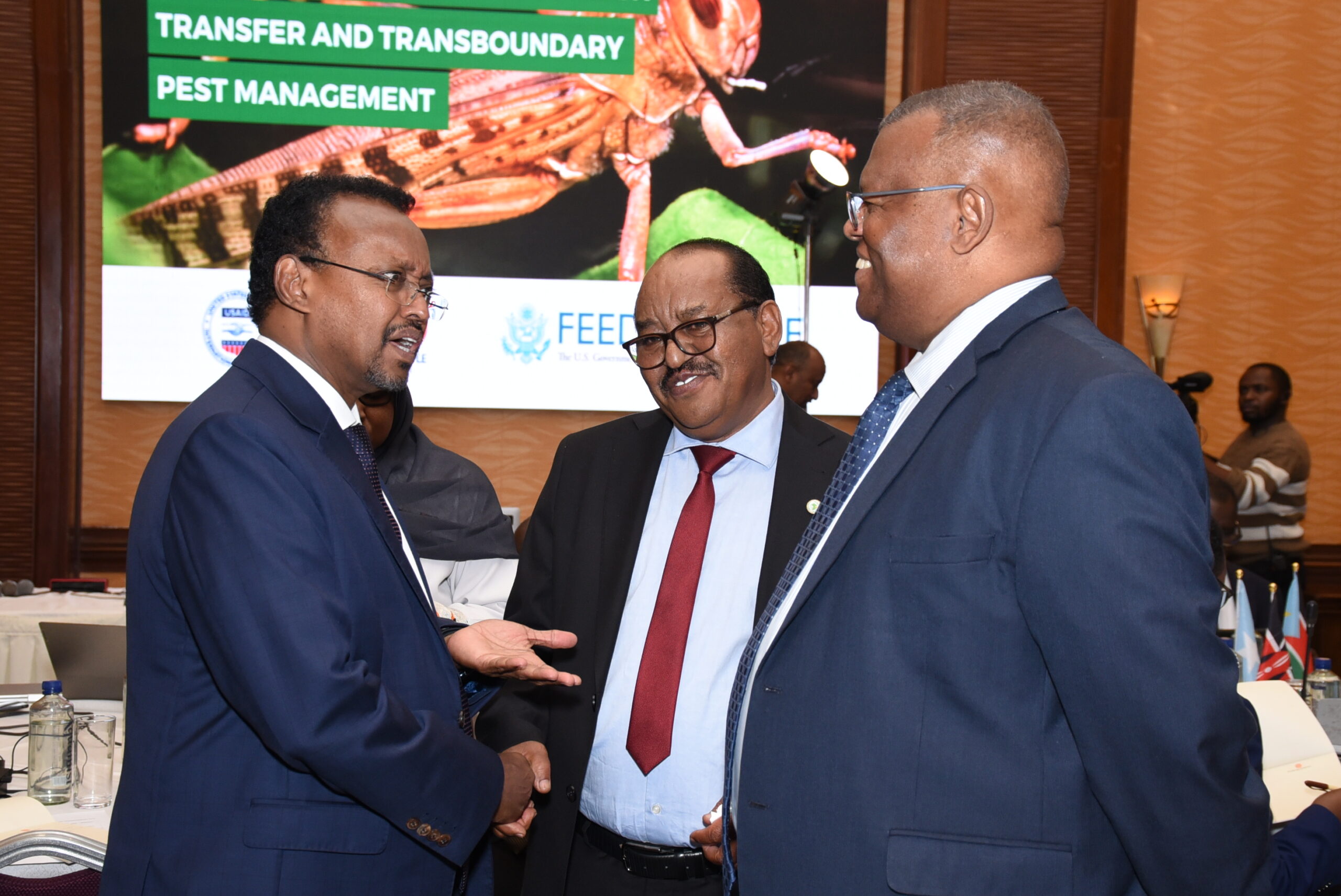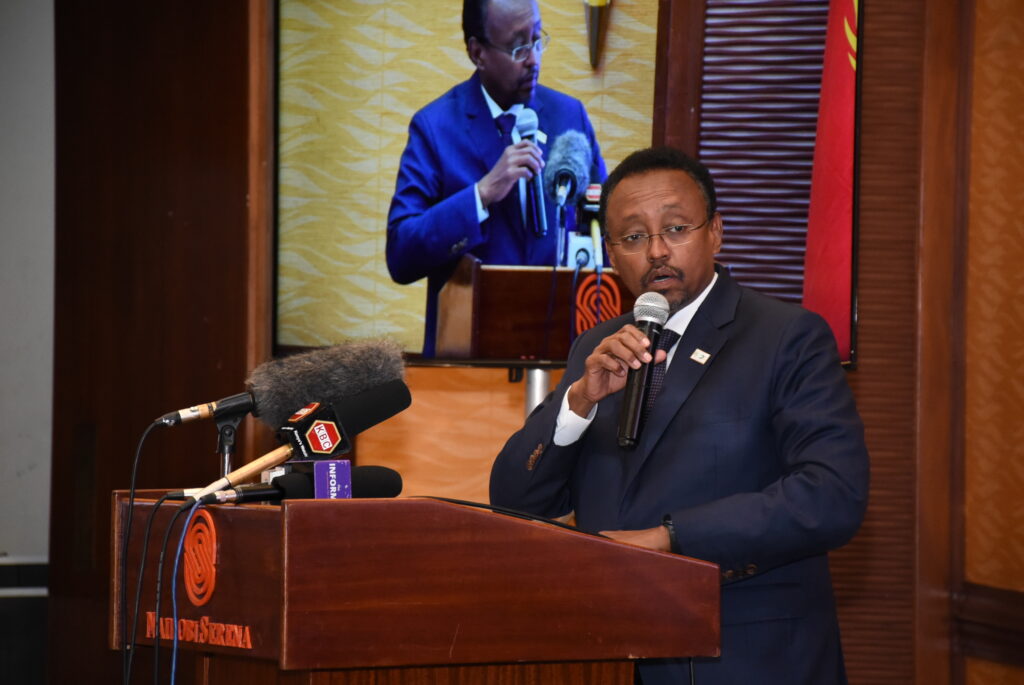
The Ministers, Heads of Delegations and representatives of Intergovernmental Authority on Development (IGAD) member states, comprised of Djibouti, Ethiopia, Kenya, Somalia, South Sudan, Sudan and Uganda convened in Nairobi, Republic of Kenya, on 9th August 2023 to chart a path towards sustainable development, having deliberated on issues pertaining to the foregoing theme; We appreciate the warm welcome and hospitality extended by the Government and the people of the Republic of Kenya, as well as the efforts being made by IGAD member states and partners to enhance risk transfer mechanisms and transboundary pest management in the region;
They appreciated the initiative by IGAD through its Climate Prediction and Applications Centre (ICPAC) and the support provided by the Government of the United States of America and the World Bank to bring together delegates from the IGAD member states and partners to discuss and share our collective understanding of the region’s state of risk transfer mechanisms and transboundary pest management and affirm our shared commitment to promote proactive risk management;
 We express concern over the region’s increased vulnerability to climate change, and the observed intensification of extreme climate events including droughts and floods, and the impacts on food security and livelihoods;
We express concern over the region’s increased vulnerability to climate change, and the observed intensification of extreme climate events including droughts and floods, and the impacts on food security and livelihoods;
We recognize the high levels of acute food insecurity in the region, driven by multifaceted drivers including climate-related shocks, conflict and insecurity, and economic shocks;
”We recall the IGAD Regional Ministerial Meeting on Strengthening, Adapting and Accelerating National and Regional Efforts to Address Food Crises in the Region held on 7th October 2022 in Nairobi, Kenya, and the strategies agreed upon and outlines in the subsequent Communiqué to enhance, modify and expedite both national and regional initiatives aimed at addressing food crises;”The Statement from the Delegation read in part.
”We also acknowledge the role of risk transfer and microinsurance mechanisms in building the resilience of societies against various risks, including natural disasters and economic shocks;”
We further recognize that many risks, such as climate-related disasters and disease outbreaks transcend national boundaries and, therefore, there is a need to explore opportunities for cross-border collaboration in risk transfer and microinsurance initiatives in order to effectively address shared challenges;
We also recall the outcomes and recommendations of the first and second Regional Conferences on Risk Transfer and Micro Insurance for Resilience Building in the IGAD region, held in Kampala and Khartoum, respectively and emphasize the importance of member states in creating conducive regulatory environments for the growth of risk transfer and microinsurance, including simplified licensing procedures and clear guidelines;
We recognize the crucial role of technology and data to enhance the efficiency of risk transfer and microinsurance operations and further recognize the need for awareness campaigns and educational programs to promote the benefits of risk transfer and microinsurance mechanisms;

They acknowledges the substantial economic and agricultural challenges presented by the transboundary pests as we recall the decision of the 34th Extraordinary Summit of the IGAD Heads of State and Government held on 9th February 2020 in Addis Ababa, Ethiopia endorsing the following three recommendations of the IGAD Council of Ministers on the desert locust invasion;
- Call upon member states to act collectively through IGAD and join forces withneighbors and relevant agencies including the Desert Locust Control Organization ofEastern Africa (DLCO-EA) towards the total eradication of this pest and address the broader aspects of climate change in the region;
- Urge member states through the IGAD Secretariat to be proactive in sharinginformation and best practices to coordinate and build the necessary capacity incombating the locust menace to predict, monitor and control the spread of new swarms; and
- Call on development partners to build the requisite financial, technical and logisticalcapacities of IGAD member states, and support ongoing efforts to effectively fight thelocust invasion.
The critical role of robust collaboration among IGAD member states and partners in promoting information exchange to bolster the effectiveness of early warning systems, surveillance, and monitoring mechanisms;
”We acknowledge the need for harmonizing policies and regulations related to transboundary pest management;”
The commendation and efforts of the development partners, including the Africa Development Bank, the World Bank, the United States Agency for International Development (USAID), the European Union and its member states, etc.;
The efforts of the IGAD Drought Disaster Resilience and Sustainability Initiative (IDDRSI) in scaling up resilience investments in the region in the face of multiple hazards and acknowledge that we all have a role to play to ensure sustainable development, and hereby affirm and resolve as follows:
- Declare our joint commitments to develop a comprehensive ‘roadmap’ that prioritizesthe strengthening of the region’s food systems, and enhancing of resilience to themultidimensional risks and shocks that impact upon food security across the region to promote community, national and regional well-being and sustainable development across the region that contributes to peace;
- Urge IGAD to devise mechanisms that improve the role of risk transfer and riskfinancing approaches in enhancing communities’ resilience and livelihoods;
- Further urge the adoption of innovative technologies, such as satellite monitoringsystems and digital data collection tools for pests’ surveillance, monitoring and controloperations and to increase access to microinsurance products and streamline processes;
- Recommend the IGAD governments and secretariat to develop supportive andsynchronized policies and legal frameworks that recognize and promote the role ofcooperatives in pastoral and agro-pastoral sectors;
- Appeal to IGAD member states and partners to accelerate investments in improvingthe resilience of the region’s food systems, recalling the previous commitment tostrengthen the linkages between regional coordination mechanisms and the implementation of food systems national pathways, developed as a critical outcome from the Food Systems Summit;
- Encourage IGAD member states, in partnership with relevant stakeholders, to fostercollaboration and knowledge sharing to promote cross-border risk transfermechanisms and facilitate the exchange of best practices in microinsurance;
- Commit IGAD Member States and Secretariat, in partnership with relevantstakeholders, to develop measures to strengthen the capacity for multi-hazard earlywarning early action mechanisms at national and regional levels, that break the cycleof recurrent food crises, and transform food systems as a critical element to support sustainable development and peace;
- Resolve to encourage continuous innovation in micro insurance product developmentto address the specific risks faced by different communities and sectors in the region;
- Commit to harmonize regulatory frameworks for risk transfer and microinsuranceacross IGAD member states, and create an enabling environment for the growth andsustainability of microinsurance initiatives, ensuring consumer protection and financial stability;
- Reaffirm our commitment to collaborative efforts in addressing transboundary pestrelated challenges and emphasize the importance of information sharing, capacitybuilding, and joint research initiatives for effective pest management and control;
- Recommend, recalling the communique of the IGAD ministerial meeting in October,2022 in Nairobi Kenya, IGAD and Member States to prioritize the strengthening oftransboundary pest management mechanisms – including establishing coordinated Early Warning-Early Action systems and data generation and sharing;
- Declare our support to establish robust transboundary pest-related informationsharing mechanisms among IGAD member states and propose the development of acentral database that facilitates real-time exchange of pest-related data, including pest outbreaks, distribution patterns, and control measures;
- Urge the adoption of Integrated Pest Management approaches that areenvironmentally sustainable and economically viable;
- Further urge the IGAD Transboundary Pest Platform to develop regional harmonizedguidelines and regulations to facilitate the adoption of biopesticide and biologicalcontrol to support an effective response to desert locusts and other transboundary pests at national and regional (cross-border) level;
- Support the role of DLCO-EA through modernization and restructuring to strengthenearly warning response for effective pest management. The support should cover theassessed technical, institutional and financial sustainability (reviewing roles and mandates, capacity gaps, identifying overlaps and synergies, etc.);
- Commit to work with DLCO-EA and research institutions at national, regional andinternational levels to conduct fundamental assessments and research on topicsrelated to surveillance and management of desert locusts and other transboundary pests.
- Recommend IGAD, DLCO-EA and FAO to collaborate, synergize their activities incombating desert locust and other transboundary pests and provide technical supportto member states to enhance their early warning systems.
- Encourage strengthening of public-private partnerships to ensure the availability of inputsand services needed to manage transboundary pests, and risk transfer and microinsurance products Done on this 9th day of August 2023 in Nairobi, Kenya














